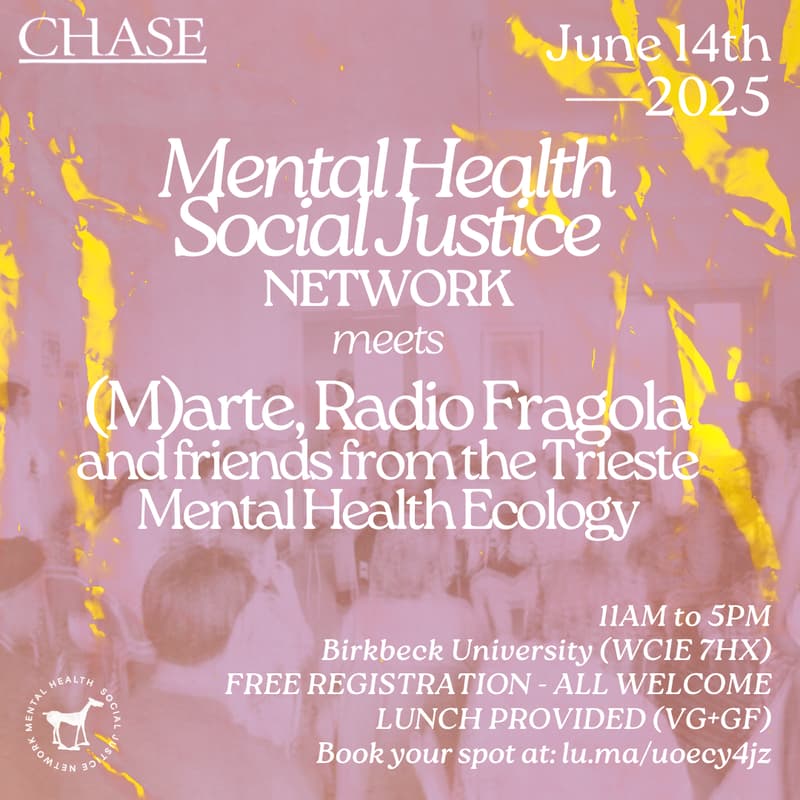

The Trieste Mental Health Ecology: beyond 'models' - MHSJ Network
MHSJ is organising a delegation of service users and workers involved in Trieste’s Mental Health ecology to visit London in June 2025.
Since a large social movement in Italy led to the formal closure of asylums in 1978, there has, in Trieste, been an ongoing experimentation in democratic forms of mental health care rooted in an ecology of open-door mental health centres, social cooperatives, social housing, ‘micro-areas’ and creative/artistic practices. The Trieste delegation will be coming to engage in a dialogue with anyone interested in learning more and sharing experiences of the system here.
This will be a forum to learn and exchange ideas open to service users, survivors, those who have been unable to access mental health services, professional or practitioners working in mental health, or those self-organising or supporting work in this area.
This event is supported by the CHASE Doctoral Training Partnership.
_______________________
Schedule for the day:
10:00–11:00
Arrival & Object Archive Begins
Doors open, tea and coffee available. Participants are invited to place a personal object on the red carpet, which is traveling from Barcelona to London via Trieste. Bring an object that speaks in some way to your experience of mental health, care, or to any of the reasons that bring you to this meeting. These objects, each of which will find a place on the red carpet, will work to map the group, and the systems we speak of or to.
11:00–13:00
Session One: Understanding the Trieste Ecology
This session introduces the history and present of the Trieste mental health ecology, known globally for its radical history. We will briefly speak to the importance of Trieste for ongoing struggles around mental health care provision in the UK. Then, we will delve into the social struggles which have contributed to shaping Trieste’s network of community-embedded services, the nation-wide legal infrastructure born from this experience, as well as the changing form of Trieste’s ecology (and of its constituent parts) and its present challenges.
Framing the UK context
The history and struggles around mental health in Italy
Mapping today’s mental health ecology in Trieste
Open Discussion, everyone invited to join in!
Transition and outline for the afternoon
Please note that there are two side rooms accessible from the main room where the morning’s activity will take place. One will host the red carpet object archive, the other a quiet space for respite. You are invited to move across these rooms as you need/wish.
13:00–14:00
Lunch
A vegan, gluten-free meal will be provided. This will be a chance to eat together, get to know each other and continue our conversations from the morning informally, or decompress and rest. You might also wish to have a look at the objects that have found their place on the red carpet.
14:00–15:15
Workshops
We’ll break into thematic groups for collaborative sessions that build on the morning’s discussion and explore in more depth some of the questions that have emerged. Each group will gather around a smaller red carpet. We imagine these groups as spaces where we can develop a language together. This language can also be visual or textual, and the discussions could take shape around a shared creative practice, crafting, or mapping exercise.
The four thematic areas will be:
Open Door Services & No-Restraint Care
Mad Radio & Podcasting
Microareas, Co-ops & Ecologies of Care
MARTe: the role of art-making as founding practice in grassroots mental health spaces
Materials will be provided on the day. Your contributions could take many forms — talking, writing, drawing, listening. You are invited to participate in whichever manner feels right to you.
Ideally, we would like participants to engage with one single discussion group, so that there is the time to get to know each other and get into a good rhythm — however, no one is expected to stay in a place where they feel uncomfortable!
15:15–15:45
Break
15:45–17:00
Final Plenary
We’ll return to the large group to share what emerged in our discussion groups. This final session will reflect on what we’re coming away with from the day, and where we might go next – also in relation to current struggles around mental health care and welfare here in the UK.